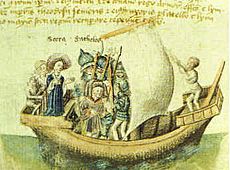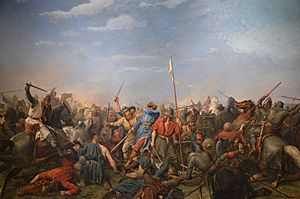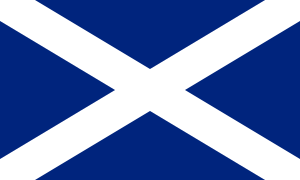Etymology of Scotland facts for kids
Scotland (called Scottish Gaelic: Alba in Scottish Gaelic) is a country that makes up the northern part of the island of Great Britain. It is one of the four countries that form the United Kingdom. The name Scotland comes from the Latin word Scoti. This was a name given to the Gaels, who were people from Ireland. The exact origin of the word Scoti is not fully known.
Contents
What's in a Name? The Story of "Scot" and "Scotland"
The word "Scot" first appeared in Latin writings around the 300s AD. It was used to describe a group of people who sailed from Ireland to raid Roman Britain. Over time, this name was used for all Gaels. It's thought that Gaelic groups didn't call themselves Scoti in ancient times, unless they were writing in Latin.
Some historians believe "Scoti" might come from a word meaning "a man cut off." This could suggest they were a group of people who had separated from others. Another idea is that it came from a Gaelic word meaning "swarm." However, this idea is not widely accepted by experts today.
The Latin word Scotia meant "land of the Scot(t)i." At first, this word referred to Ireland. But by the 1000s, English writers started using "Scotland" to mean the Gaelic-speaking kingdom of Alba. This kingdom was located north of the River Forth. Some of the oldest documents that mention "Scotland" are versions of the Anglo-Saxon Chronicle. These writings from the 1000s say that before the Battle of Stamford Bridge in 1066, Earl Tostig Godwinson found safety in "Scotland" with Malcolm III, the King of Scots. The name "Scotland" was used alongside "Albania" or "Albany," which came from the Gaelic word Alba. It was only later, in the Late Middle Ages, that the words "Scots" and "Scotland" became common for the entire country we know today.
Who is a Scot Today?
In modern times, the word "Scot" refers to all people who live in Scotland. This is true no matter what their family background is. However, some people in Scotland still see a difference. They might distinguish between those who feel Scottish because of their family history and those who feel Scottish because they are citizens of Scotland.
The word "Scots" is also used to describe the Scots language. Many people in Scotland speak this language to some degree.
Other Names for Scotland
The Scottish Gaelic and Irish Gaelic name for Scotland is Alba. This name comes from the same ancient Celtic root as the name Albion. Albion usually refers to the entire island of Great Britain.
The term "Alba" might come from an early word meaning "white." This could refer to the white chalk cliffs near Dover in England. Interestingly, Dover is at the opposite end of Great Britain from Scotland. Another idea is that it comes from the same root as "the Alps." This suggests it might be an old word for mountains, linking it to the mountainous northern part of Britain.
Caledonia is an old Latin name for Scotland. It comes from the Caledonii tribe. We don't know what the Caledonians called themselves. However, their name might have come from a Brythonic word meaning "hard" or "tough." This is similar to the modern Welsh word caled.
See also
 | Delilah Pierce |
 | Gordon Parks |
 | Augusta Savage |
 | Charles Ethan Porter |




